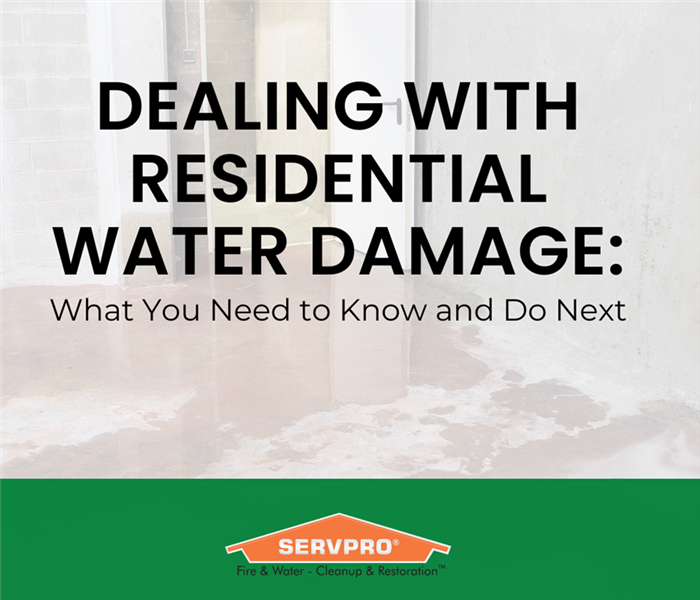Dealing with Residential Water Damage: What You Need to Know and Do Next
11/20/2024 (Permalink)
 As a trusted leader in the restoration industry, SERVPRO of Natick/Milford has the expertise and advanced equipment needed to restore your home or bus
As a trusted leader in the restoration industry, SERVPRO of Natick/Milford has the expertise and advanced equipment needed to restore your home or bus
Water damage in your home can happen without warning—whether from a burst pipe, flooding, or a roof leak.
No matter the cause, water damage can lead to significant problems like structural issues, mold growth, and loss of personal belongings. Acting quickly is essential to minimize damage and begin the restoration process. Here’s a step-by-step guide to handling residential water damage and understanding the importance of professional restoration services.
Step 1: Identify and Stop the Water Source
The first step in addressing water damage is to locate and stop the source of water intrusion. If the issue stems from a burst pipe, shut off your main water supply. For external problems, such as a broken water main, contact your utility provider. In cases of flooding from natural disasters, wait until the water recedes and ensure the area is safe before entering.
Step 2: Assess the Damage
Once it’s safe, evaluate the extent of the water damage. Water can seep into walls, floors, and ceilings, often causing hidden problems. Mold can begin developing within 24-48 hours, so prompt action is critical. Take photos and document the damage for your insurance claim. Depending on the severity, professional assessment may be necessary to uncover unseen issues.
Step 3: Notify Your Insurance Provider
Contact your homeowner’s insurance company to report the damage and begin the claims process. Provide detailed documentation, including photos and estimates for repairs. Keep records of any related expenses, such as temporary housing, repairs, or item replacements, as these might be reimbursable under your policy.
Step 4: Remove Water and Dry the Area
Standing water can cause additional structural damage and create ideal conditions for mold growth. Professionals use specialized equipment, such as high-powered pumps, vacuums, and industrial fans, to extract water and dry affected areas efficiently.
- Carpets and Flooring: Soaked carpets often need removal and drying or replacement. Wood floors may swell or warp and require professional treatment to restore.
- Drywall and Insulation: Wet drywall typically needs to be cut out and replaced to prevent mold. Damaged insulation loses effectiveness and can become a health hazard, so it should be removed and replaced.
Step 5: Prevent Mold Growth
Mold can develop in hidden areas like behind walls, under floors, or inside insulation. Its spores can spread quickly, posing health risks to your family. Professional restoration teams use advanced tools, such as moisture meters and antimicrobial treatments, to detect and eliminate hidden moisture and prevent mold growth.
Step 6: Restore and Repair
Once the water is removed and the area is dry, begin the restoration process. Depending on the extent of the damage, this may include:
- Replacing drywall, flooring, and insulation
- Repairing or replacing damaged cabinetry, furniture, and fixtures
- Restoring personal items like electronics, clothing, and documents
Professional restoration experts can guide you through these repairs to ensure your home is safe and fully restored.
Step 7: Take Preventive Measures
After restoration, take proactive steps to reduce the risk of future water damage. Regularly inspect areas prone to leaks, such as roofs, windows, and plumbing. Consider installing a sump pump if you live in a flood-prone area and waterproof your basement to provide additional protection.
Don’t Delay—Act Fast
Water damage can be overwhelming, but quick action can minimize its impact and reduce repair costs. Identifying the source, removing water promptly, and working with restoration professionals can save your home from long-term issues like mold and structural damage.
If your home has experienced water damage, don’t wait. Contact our water damage restoration team today for prompt, reliable service to help you recover safely and efficiently.
As a trusted leader in the restoration industry, SERVPRO of Natick/Milford has the expertise and advanced equipment needed to restore your home or business. Call us at (774) 290-4300 to get started.




 24/7 Emergency Service
24/7 Emergency Service